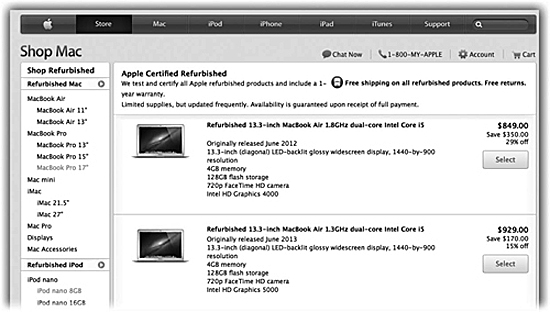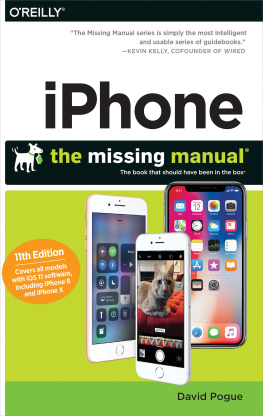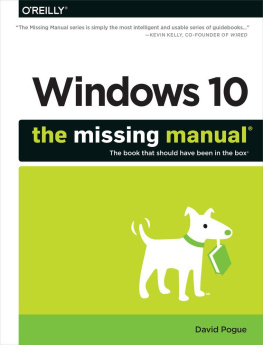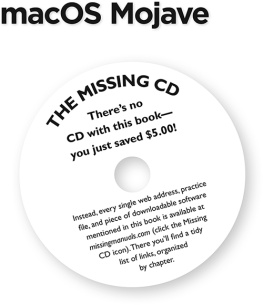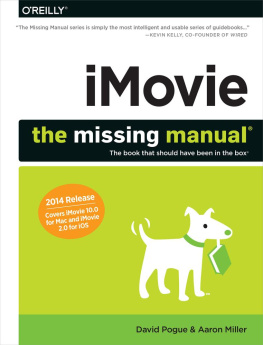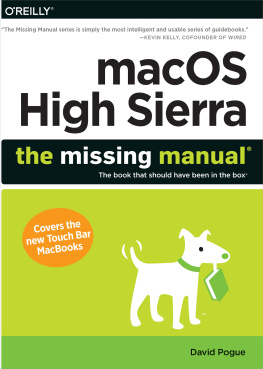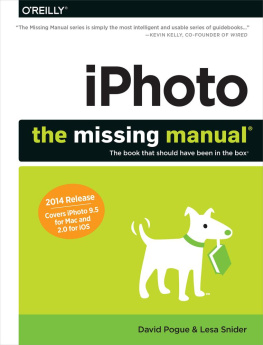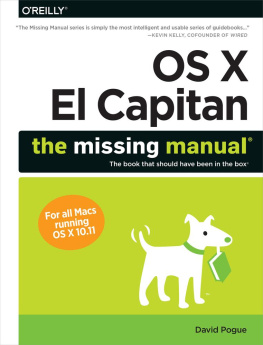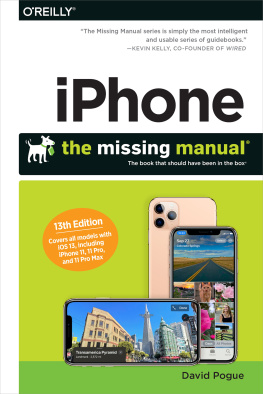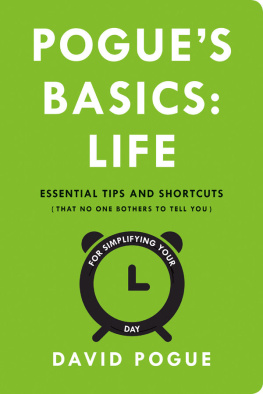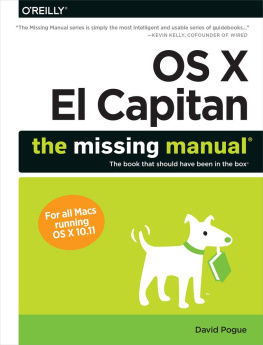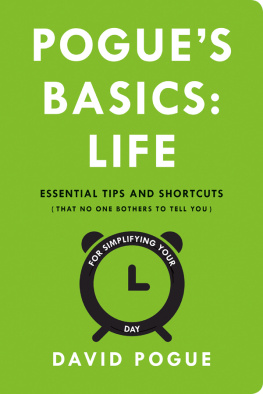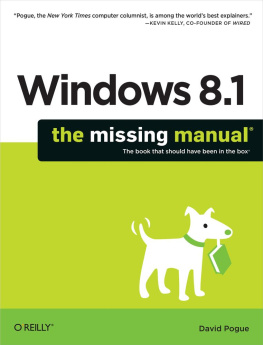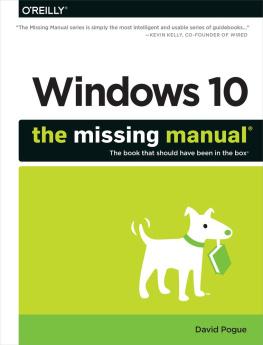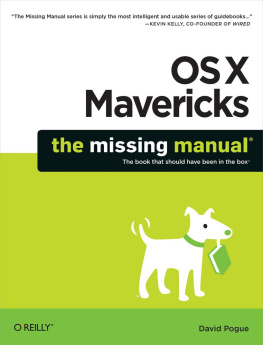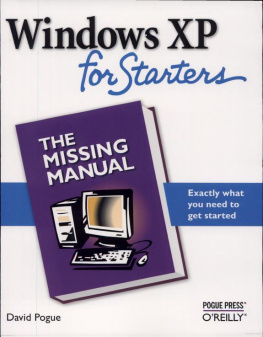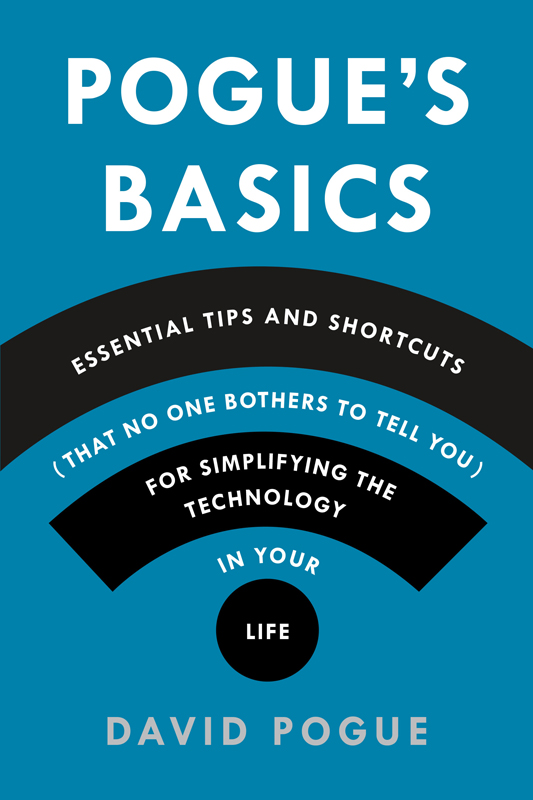Contents
Guide

The author and publisher have provided this e-book to you for your personal use only. You may not make this e-book publicly available in any way. Copyright infringement is against the law. If you believe the copy of this e-book you are reading infringes on the authors copyright, please notify the publisher at: us.macmillanusa.com/piracy.
Contents
For Kell, Tia, and Jeff,
who remind me every day what the real basics are;
and for Nicki,
who has a way of making dreams come true
In this country, you need a license to do anything that might get you into trouble: drive a car; own a gun; get married.
But when it comes to technology, they shove you out of the nest without so much as a pat on the back. Theres no drivers ed class for tech. Theres no government pamphlet that covers the essentials. Somehow, youre just supposed to know how to use your camera, phone, e-book reader, GPS, printer, Web browser, e-mail system, and social network.
And thats only half of the problem.
Why tech moves so fast
Every industry has a business model, right? A system of making money.
Sometimes the transaction is obvious: You hand over a bill, and you take home a jar of pickles.
Sometimes its sneakier: You pay only $50 for an inkjet printer, but you pay many times more for the ink cartridges. (If you do the math, youll find that printer ink comes out to about $8,000 a gallon. And you thought gas companies were greedy?)
Well, the technology industry has a little business model of its own, and its based on insecurity.
Yours, to be precise.
Every year, it introduces a new version of whatever it is youve bought. That software, that phone, that tablet. Of course, nobody forces you to upgrade to the new one, but youre made to feel feeble and obsolete if you dont. What iPhone model do you have? Youre not still running that version of Word, are you? What generation iPad is that?
This annual tech upgrade cycle has become so ingrained that the cell phone carriers invoke it with a slogan: New every two. Every two years, youre supposed to want a new phone, a new camera, a new laptop. Otherwise, youre a loser, right?
How featuritis happens
This annual insecurity cycle works out beautifully for tech companies. But there are two problems with it.
First, if we believe in new every two, we have to throw away the gadgets we bought last time. They have to go somewhere. The landfills fill up with the stuff, and those discarded gadgets leak some pretty toxic juice.
Second, how do you suppose the hardware and software companies entice you to buy their new versions each year? Two words: more features.
Each year, they pile on more and more and more features. More controls, more buttons, more bloated software.
Trouble is, if you slather on enough new features, you eventually wind up adding stuff nobody has actually asked for. Eventually, you make your product a monstrosity.
Consider Microsoft Word: At one time, it was a word processor. Today, its also a Web-design program, a database, and a floor wax. The average person uses about 6 percent of Microsoft Words features (and probably feels inadequate as a result).
These companies dont seem to realize that people have lives. Most people have work to do, places to go, people to see, families. Were not full-time technologists.
You can see where all of this is going. Eventually, you find yourself the proud owner of technology products that overwhelm you. Maybe you know enough to get bymaybe you dont even know thatbut you have the nagging suspicion that youre not getting the most out of your tech.
Whos there to teach you the features that matter and give you permission to ignore the rest?
How this book happened
I first noticed the growing I dont even know the basics crisis years ago. I was waiting in a book publishers office, watching a receptionist become increasingly frustrated. She was editing something on the screen. She was trying to select just one word in a document.
And she was doing that by painstakingly dragging her cursor across the word. Each time, shed go a little bit too high or too low, and shed wind up selecting an entire extra line of text.
After ten minutes of this, I couldnt stand it: Why dont you just double-click the word ?
She didnt have a clue you could do that! (See if you dont, either.)
In any case, I thought I should maybe write up a list of my favorite things you thought everybody knows, but they dont tips on my New York Times blog. BOOM: 1,500 reader comments in two days.
Then I put together my favorite ten of them and demonstrated them live onstage at the 2013 TED conference (a trendy annual gathering dedicated to Technology, Entertainment, and Design). The TED people posted the video of that talk on ted.com. BOOM: 4 million views.
I was convinced that I was onto something. There really isnt anyone putting together a master list of the knowledge thats essential for todays technology.
Or, rather, wasnt. Congratulations: Youve found it.
This books mission in life is to collect, in one place, every essential technique youd think everybody knows about technology(but youd be wrong.)
You may know some of these tips already. No problem; skim them and savor the rosy glow of smug superiority.
Other tips might seem more like geeky shortcuts. Thats fine, too. Adopt the ones that seem worth it for you.
What binds all of these tips together, though, is this: They make using technology faster and easier. Fewer steps. Less hassle. Less annoying.
The point is that if this book teaches you only one new trick that makes your life easier
Well, then it wasnt a very good book.
But youll probably pick up a lot more than that!
When to buy new tech
Youll never stop the Great Treadmill of Technology Upgrades. Its just the way of the world: Whatever technology you buy today will be obsolete soon.
But at least you can arm yourself to cope with it.
You can learn, for example, when new gadgets will be introduced each year, so youll never be caught by surprise. You dont want to be that sucker who buys the iPhone 6 three weeks before the iPhone 7 comes out.
In general, Apple introduces a new iPhone every September and a new iPad every October. The iPods are updated every September, too.
Samsungs Galaxy S phones appear every April.
New camera models come out in February and October.
New everything else comes out just in time for the holidays.
You can play the game in one of two ways. If you wait to buy until the end of the products life, youll generally save money, because the price will have slunk downward since its introduction. (The exception: Apple products. Their prices dont sink much over time.)
And if you wait to buy until the new product comes out, then youll avoid the sinking feeling that youre a sucker.
Save big money on new tech
Because we live our lives on cell phones and tablets these days, we arefinallyeasing off on buying new computers . But when the time does come, heres a tip: Buy a refurbished computer. Theyre listed in special areas of the Web sites for Apple, Dell, HP, and so on. (To find these special pages, use Google to search, for example, for refurbished Macs or refurbished Dell.)
